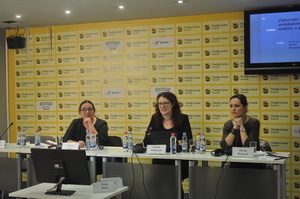 The study Equality in Practice – Implementing Serbia’s Equality Laws was presented on 12 February 2019 at the Media Centre in Belgrade. It is one of the results of the two-year project entitled Improving the Equality Legal and Policy Framework in Serbia and Monitoring Implementation of Equality Norms and Policies, implemented by the partner organisations: Praxis, London-based organisation Equal Rights Trust and Sandžak Committee for the Protection of Human Rights and Freedoms, with the support of the European Union.
The study Equality in Practice – Implementing Serbia’s Equality Laws was presented on 12 February 2019 at the Media Centre in Belgrade. It is one of the results of the two-year project entitled Improving the Equality Legal and Policy Framework in Serbia and Monitoring Implementation of Equality Norms and Policies, implemented by the partner organisations: Praxis, London-based organisation Equal Rights Trust and Sandžak Committee for the Protection of Human Rights and Freedoms, with the support of the European Union.
The study addresses the issue of continuous discrimination in Serbia, analyses the exiting legal and political framework and assesses its effectiveness in practice. In the absence of similar studies, the aim of this comprehensive study is to serve as a key reference point and evidence base for all those working on combating discrimination and promoting fundamental human rights and freedoms. On the other hand, the study aims to influence the government and the judicial system and to serve as an effective tool in advocacy for improving the efficiency of the anti-discriminatory framework.
The study is based on extensive research conducted over a 12-month period including: field research conducted by civil society organisations in different regions of Serbia; focus groups with survivors of discrimination, lawyers and civil society organisations in Niš, Belgrade, Novi Pazar, Pančevo and Vranje; over 55 one-to-one interviews with key stakeholders including lawyers, government and private sector representatives. Furthermore, the study includes the analysis and assessment of the compliance of Serbia’s anti-discrimination framework with the country’s international and regional obligations, and the analyses of the extent to which Serbia has adopted the practical measures that are necessary to ensure that its equality laws provide protection in practice.
The findings contained in this study raise serious questions about the efficiency of legislation in practice and indicate that there are areas in which the legislative framework does not ensure international best practices, despite the undisputed progress achieved by Serbia during the past decade in improving conditions and opportunities for exercising the right to equality through the adoption of the Anti-Discrimination Law and the establishment of an independent body for the protection of equality. The study has revealed a widespread lack of awareness of the existence of an anti-discrimination legal framework both among potential victims of discrimination and among public authorities and institutions, and has shown that individuals are unable or unwilling to seek legal redress due to the cost of proceedings and a lack of confidence in the judiciary as an efficient and independent form of redress.
The study provides recommendations that are also priorities that should be addressed in the future in order to improve the efficiency of Serbia’s existing anti-discrimination legal and political framework in practice.
The study “Equality in Practice – Implementing Serbia’s Equality Laws” is available in the Serbian and English language.
Source: www.praxis.org.rs
 Government of the Republic of Serbia
Government of the Republic of Serbia















 pdf [271 KB]
pdf [271 KB]
Leave a Comment